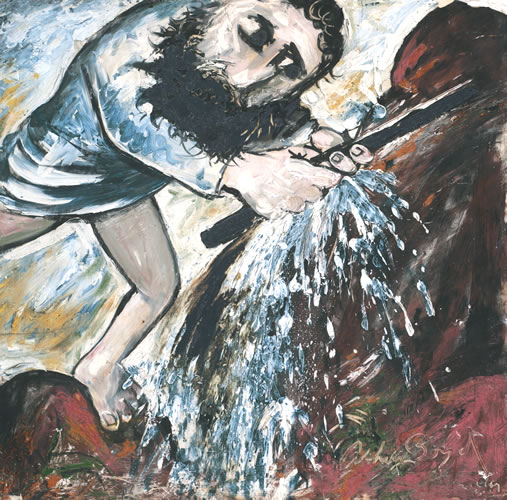In this post, I'd like to suggest - and to show - that the image of God in the language of the Bible is ambiguous. That ambiguity - you should see - is more female than male, more female, that is, in ways that both Aristotle (a male) and Nancy Mairs (a female) might use language. Or maybe you'll concede that it has to be at least (equally half) feminine.
Along the way to our listening to the Bible language, let's listen to Nancy Mairs describing the logical language acts of many men. This sort of logic is exactly the kind we see Aristotle inventing and using. Mairs says:
In order to get what he wants, then, the father must have power to coerce those around him to meet his demands. To have power is to alienate oneself, however, because power is always power over and the preposition demands an object. The fundamental structure of patriarchy is thus binary: me/not me, active/passive, culture/nature, normal/deviant, good/bad, masculine/feminine, public/private, political/personal, form/content, subjective/objective, friend/enemy, true/false. . . . It is a structure, both spatial and temporal, predicated upon separation, not relation. It demands rupture, the split into halves engendered by the abrupt erection of the phallus: those who have and those who have not. It speaks the language of opposites. . . [in] a dimorphic world.
Then she adds:
Which is not women’s language, since women, for a variety of reasons, live in a polymorphic rather than a dimorphic world, a world in which the differentiation of self from other may never completely take place, in which multiple selves may engage multiply with the multiple desires of the creatures in it. Some theorists would claim that all subjects function thus. But as Julia Kristeva points out, female subjectivity, traditionally linked to cyclical and monumental time rather than to linear time, lies outside “language considered as the enunciation of sentences (noun + verb, topic – comment, beginning – ending).” Possessing an “irreducible identity, without equal in the opposite sex and, as such, exploded, plural, fluid,” a woman may be driven “to break the code, to shatter language, to find a specific discourse closer to the body and the emotions, to the unnamable repressed by the social contract.”
The difference that emerges here is not the polarity intrinsic in the dominant discourse, which reduces “woman to man’s opposite, his other, the negative of the positive.” No, this is an absolute and radical alterity that enfolds the other, as in pregnancy a woman’s immune system shuts down in such a way that she shelters and nourishes, rather than rejects and expels, the foreign body within her: “Cells fuse, split, and proliferate; volumes grow, tissues stretch, and body fluids change rhythm, speeding up or slowing down. Within the body, growing as a graft, indomitable, there is an other. And no one is present, within that simultaneously dual and alien space, to signify what is going on.” Feminine discourse is not the language of opposites but a babel of eroticism, attachment, and empathy.
Whew. Now we may be ready to hear the language of the Bible. This language purports to exist (or at least to describe a place where and a time when there existed language, creative ambiguous language, creative ambiguous polymorphic language, creative ambiguous polymorphic and therefore feminine language) before any need “to break the code, to shatter language, to find a specific discourse closer to the body and the emotions, to the unnamable repressed by the social contract.” If Nancy Mairs or Aristotle had anything to say about it, this language was not very patriarchal from the beginning.
Here's the language to hear:
And God said, "Let us make a human in our image, by our likeness, to hold sway over the fish of the sea and the fowl of the heavens and the cattle and the wild beasts and all the crawling things that crawl upon the earth."
And God created the human in his image,
in the image of God He created him,
male and female He created them.
These are, of course, not God's words. Or are they?
Nor are they the words of Moses. Or are they?
Rather, they are the ambiguous English words of Robert Alter, aren't they?
But as bar-bar-ic, Aristotle would likely say, are these Greek words of the Jews, translating in Alexandria's empire, as if they were Sappho or somebody:
καὶ εἶπεν ὁ θεός
Ποιήσωμεν ἄνθρωπον κατ' εἰκόνα ἡμετέραν καὶ καθ' ὁμοίωσιν,
καὶ ἀρχέτωσαν τῶν ἰχθύων τῆς θαλάσσης
καὶ τῶν πετεινῶν τοῦ οὐρανοῦ
καὶ τῶν κτηνῶν καὶ πάσης τῆς γῆς
καὶ πάντων τῶν ἑρπετῶν τῶν ἑρπόντων ἐπὶ τῆς γῆς.
καὶ ἐποίησεν ὁ θεὸς τὸν ἄνθρωπον,
κατ' εἰκόνα θεοῦ ἐποίησεν αὐτόν,
ἄρσεν καὶ θῆλυ ἐποίησεν αὐτούς.
καὶ ηὐλόγησεν αὐτοὺς ὁ θεὸς λέγων
Αὐξάνεσθε καὶ πληθύνεσθε,
καὶ πληρώσατε τὴν γῆν καὶ κατακυριεύσατε αὐτῆς,
καὶ ἄρχετε τῶν ἰχθύων τῆς θαλάσσης
καὶ τῶν πετεινῶν τοῦ οὐρανοῦ
καὶ πάντων τῶν κτηνῶν καὶ πάσης τῆς γῆς
καὶ πάντων τῶν ἑρπετῶν τῶν ἑρπόντων ἐπὶ τῆς γῆς.
And as least equally ambiguous is this language:
כו וַיֹּאמֶר אֱלֹהִים, נַעֲשֶׂה אָדָם בְּצַלְמֵנוּ כִּדְמוּתֵנוּ; וְיִרְדּוּ בִדְגַת הַיָּם וּבְעוֹף הַשָּׁמַיִם, וּבַבְּהֵמָה וּבְכָל-הָאָרֶץ, וּבְכָל-הָרֶמֶשׂ, הָרֹמֵשׂ עַל-הָאָרֶץ.
כז וַיִּבְרָא אֱלֹהִים אֶת-הָאָדָם בְּצַלְמוֹ, בְּצֶלֶם אֱלֹהִים בָּרָא אֹתוֹ: זָכָר וּנְקֵבָה, בָּרָא אֹתָם.
כח וַיְבָרֶךְ אֹתָם, אֱלֹהִים, וַיֹּאמֶר לָהֶם אֱלֹהִים פְּרוּ וּרְבוּ וּמִלְאוּ אֶת-הָאָרֶץ, וְכִבְשֻׁהָ; וּרְדוּ בִּדְגַת הַיָּם, וּבְעוֹף הַשָּׁמַיִם, וּבְכָל-חַיָּה, הָרֹמֶשֶׂת עַל-הָאָרֶץ.
.jpg)


